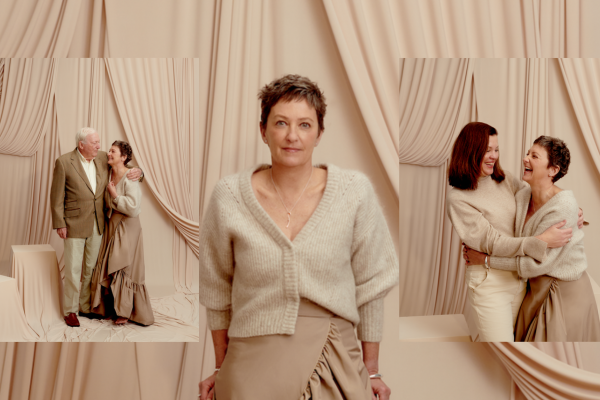Ovarian cancer patients rely on ‘the village’ around them; people who provide support from the time they are diagnosed, during their treatment experience and throughout their recovery. This year, the OCRF and Georg Jensen honour those in the village – from loved ones, oncologists and surgeons who provide much needed care, to advocates and researchers, who dedicate their time to creating better outcomes. Their combined power will change the future of ovarian cancer, for good.
Ovarian Cancer Research Foundation ambassador Georgie Beck bravely shares her personal ovarian cancer journey as the face of the 2023 Georg Jensen campaign.
A wife and mother to three teenage boys in Sydney, Georgie’s life had always been highly active and busy – weekends and weeknights filled with the boys' activities – herself playing tennis or exercising four or more times a week.
Georgie's life changed on June 30th, 2022, when she received her shock diagnosis of stage 4B High Grade Serous ovarian cancer. She was just 49 years old.
As part of the 2023 Georg Jensen campaign, Georgie retells her story of diagnosis, treatment and how the loved ones around her built an unwavering steadfast village of support.
.png)
Tell us about your ovarian cancer diagnosis
I had some bloating for around 2 weeks and in the few days before I went to the doctor – when running – I felt heaviness in my uterus and pelvic floor. I had a pelvic mesh imbedded after my three kids that was 10 years old and thought maybe it was failing. So, I went to my doctor.
One year earlier, I had full blood samples taken, a pap smear, a breast examination that was all clear.
During my doctor’s visit I was expecting a referral to my gynaecologist. Instead to my shock, the GP rushed me for an urgent internal ultrasound and blood test.
In the ultrasound, I'll remember so clearly how the technician went very quiet before escorting me down to their CT scanner, plonking me at the front of the line declaring, “she’s in first”. I knew at that point something was not good.
The day I had my follow up appointment with my doctor I went to my regular boxing class that morning before heading to the clinic by myself. His words still ring in my ears “You have ovarian cancer, it is in your spleen and maybe your liver. I have booked your oncologist for Tuesday, and your surgeon for Wednesday – they are the best I know in Sydney. You have a very serious illness.”
Upon reflection, I am so grateful to my doctor for acting and diagnosing me so quickly.
A few days after my diagnosis I looked like I was 5 months pregnant, and I couldn’t walk to the end of the street. I had 500ml of ascites drained within that week.
Watch Georgie feature the 2023 Georg Jensen x OCRF campaign video:
Shop the Georg Jensen OCRF pendant
How did you feel during your ovarian cancer diagnosis?
My reaction was of disbelief as I felt fine, I was still super active and had only a few symptoms for a short period of time, so to be diagnosed with Stage 4 was a shock.
I knew nothing about ovarian cancer when diagnosed so of course I googled it and what I learnt was shocking. The first thing I read was “ovarian cancer is the deadliest female cancer”, my son and husband came home to me in floods of tears.
How could I have one of the most lethal cancers, yet be boxing and feeling fit on the very morning I was diagnosed with stage 4 ovarian cancer?
What was the treatment journey like for your ovarian cancer & where is your health at now?
I started chemotherapy within two weeks of my diagnosis – the day after my husband’s 50th birthday, and I sadly had to cancel our joint birthday trip and parties. I turned 50 years old mid-chemo, bald and tired.
I had an allergic reaction to the first of four rounds of chemotherapy, which was super scary as I stopped breathing; they had to slow flow the chemo after that so I could tolerate it.
Each chemotherapy session took 6-7 hours, every three weeks. I had low white blood cells so had to inject myself to stimulate white blood cells – this gives you incredibly sore bones throughout your body. My exploratory surgery had to be postponed until two weeks before my major surgery to get the blood count high enough.
On the 29th of October 2022, I had a twelve-hour surgery with two surgeons and two fellows that resulted in eight abdominal organs removed: my ovaries, uterus, fallopian tubes, lymph nodes, appendix, omentum, peritoneum, and spleen. I also had heated chemotherapy into my stomach during surgery as part of the HYNOVA trial. This surgery leaves you with a significant battle scar running from my rib cage, all the way to my pelvis.
I got out of hospital post-surgery on my son’s 17th birthday.
I found out on World Cancer Day in February 2023 that I reached NED (No Evidence of Disease). This August I had my '9-month since surgery' scan which is still clear: I am 10 out of 16 maintenance treatments down.
Unfortunately, the maintenance treatment is quite harsh: my arms are constantly in pain, I have inflammation in my joints, I also have suspected ear nerve damage that is a 9 out of 10 pain constantly. I take slow-release nerve blockers for this and have a second brain MRI to try and work out what is going on. I have to take blood pressure tablets, to combat the side effects of Bevacizumab and an antibiotic every day, as I have no immune system due to my spleen being removed.
But I am happy and can do most things – I love being busy and must be careful to moderate myself as I get worn out quickly.

What was it like sharing your ovarian cancer diagnosis with your family and friends?
Telling family was tough as we didn’t know what was going on for the first 10 days and what was going to happen. We set up What’s App groups for our friends to keep them up to date with treatment.
My girls’ What’s App group is called G’s Fight Club and has been an enormous support. They have compiled music playlists to lift my spirits and chillout ones for hospital. They sent me food, jokes and funny memes and fresh sheets to come home from hospital.
WHAT SHOCKED YOU ABOUT OVARIAN CANCER AND WHAT DRIVES YOU TO SHARE YOUR STORY PUBLICLY?
The biggest shock was that I felt so healthy and normal when I diagnosed. The symptoms were vague and are things that most women experience every month. I was also surprised that there was no early detection test and assumed that the pap smear and blood tests I had done the year before covered all gynaecological cancers.
Ovarian cancer also has the second highest recurrence rate at approximately 85% and my stage of cancer has a recurrence rate of around 90-95%.
I am driven to share my story publicly to help other women be aware of the symptoms so hopefully they can be diagnosed earlier than I was. I am also passionate about research for an early detection test, as this is crucial to helping women overcome the cancer before it presents in the later stages.
Ovarian cancer treatments and survival rates have not improved significantly for decades and this is due to underfunding of vital research.
It is also important to break down the barriers to talking about gynaecological issues and cancers. I want to normalise for men and boys to talk about these issues. I also want to show my boys it is possible to change an unfortunate situation or life event into something positive and worthwhile, and how you react to a life challenge is up to you and your attitude.

WHO HAS BEEN IN YOUR VILLAGE DURING THIS OVARIAN CANCER JOURNEY?
My village is diverse, and you need all these people to thrive and heal with on this journey. It comprises of friends and family, health professionals, from my oncologist and surgeons to osteopath and counsellor, my boys' schoolteachers, my teal nurse and online support group.
My friends and family cheer me on, bring food, flowers, and lend me an ear when needed. My health professionals use their knowledge to keep me well. My counsellor listens to my darkest thoughts and steers me to the light. My boys’ teachers support and keep an eye on my kids. My teal nurse is there on the end of the phone when I need practical help. The online support group knows what it is like and shares the journey.
The 2023 campaign theme “it takes a village” resonates with me as I have so many people from many different backgrounds and skillsets in my personal village. Some people are there every day and others I have never met but are on the phone or online.
My village has given me strength and resilience to live my best life.
.gif)